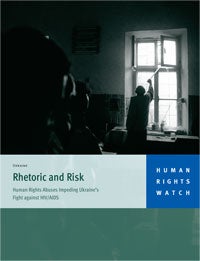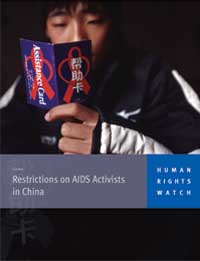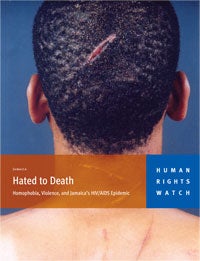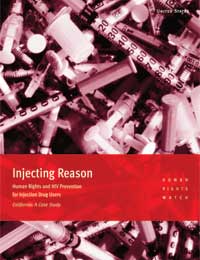 |
 |
 |
 |
“Rhetoric and Risk: Human Rights Abuses Impeding Ukraine's Fight Against HIV/AIDS" Ukraine: March 2006 Ukraine is home to the worst HIV/AIDS epidemic in Europe, and one of the fastest-growing epidemics in the world. The epidemic has been fuelled by harsh drug policies and routine police abuse against drug users – those hardest hit by HIV/AIDS – together with widespread discrimination by health care providers against drug users and people living with HIV/AIDS. Ukraine law and policy incorporates human rights protections – such as guarantees of the right to HIV/AIDS information, to confidentiality of HIV/AIDS test results, to free medical care for people living with HIV/AIDS – and progressive, evidence-based policies – such as syringe exchange and opiate substitution therapy. But these important government commitments have been systematically undermined by chronic human rights abuses by police and health care workers. Physical and psychological abuse by police of injection drug users and sex workers, and discriminatory and dehumanizing treatment by health care workers of drug users and people living with HIV/AIDS have kept many from receiving lifesaving HIV/AIDS information and services. Unless immediate and concerted action is taken, these human rights abuses could undo many of the important steps that Ukraine has taken to stop its HIV/AIDS epidemic. “I have been arrested before at this spot [the needle exchange point]. . . . There were syringes on the ground. A policeman came and picked up the syringe and said, ‘It’s yours,’ and charged me. . . . I am afraid to carry syringes because of police. Sometimes I avoid the needle exchange because of police.” |
 |
“Restrictions on AIDS Activists in China” June 2005 After years of denial surrounding the spread of HIV/AIDS in China, senior Chinese government officials have recently begun to acknowledge and confront the existence of a rapidly growing epidemic. To its credit, the government has encouraged the growth of dozens of grassroots organizations that provide outreach and education programs to those at risk, and advocate for the rights of those infected. Yet the Chinese state remains deeply ambivalent about these groups, and NGOs face a maze of bureaucratic obstacles and harassment by local authorities. AIDS activists report being detained and harassed – even beaten – by police who want to prevent them from conducting outreach efforts or speaking to the media, and education programs are being hampered by censorship campaigns. China must immediately address these barriers if it hopes to avoid the rising catastrophe of this growing epidemic. “The volunteers cannot protect their [own] lives.... They came to Henan in order to help these AIDS orphans, but only received bad treatment from the government. After consideration, they decided to go back home.” |
 |
"Lessons Not Learned: Human Rights Abuses and HIV/AIDS in the Russian Federation" April 2004 The Russian Federation faces a deadly AIDS epidemic that is being driven by human rights abuses of the more than 1 million Russians living with HIV/AIDS and whose marginalized status puts them at high risk of the disease. Though injection drug use is the primary cause of HIV transmission in Russia, the Russian government has done little to support measures that would prevent the spread of HIV by these means. The government has permitted police to disrupt syringe exchange programs and it bans outright the use of methadone to treat opiate addiction – measures that have been proven central to effective HIV prevention. Harsh penalties for small-scale drug possession has landed many drug users in jail, and the absence of HIV prevention services in prisons (and elsewhere) has spelled a death sentence for many of these people. Yet rather than learning from the experiences of countries with more mature HIV/AIDS programs, Russia has systematically rejected well-established lessons of fighting AIDS. It has also done little to combat common stigma and ignorance related to HIV infection, including the misperception that HIV can be spread through casual contact. To prevent the further spread of this growing epidemic, the Russian government must act to combat ignorance and abuse “The doctor told me that they would rather give treatment [for HIV/AIDS] to me than to my sister who still uses drugs. They told my sister ‘you’re not worth it—sooner or later you’ll just wind up in prison.’” |
 |
“Hated to Death: Homophobia, Violence, and Jamaica’s HIV/AIDS Epidemic” Jamaica: November 2004 Jamaica’s growing AIDS epidemic has unfolded amidst widespread violence and discrimination against people living with HIV/AIDS, as well as homophobia fostered by both law and popular culture. Myths about HIV/AIDS have fueled this situation, as many Jamaicans believe that AIDS is strictly a disease of homosexuals and sex workers, and that it can be transmitted by casual contact. This ignorance has put people living with HIV/AIDS in Jamaica – as well as its lesbian and gay population – in a state of constant fear, exacerbated by the brutal murder of a leading gay rights activist in June 2004. Men who were perceived to be gay and people living with HIV/AIDS have commonly found themselves targets of violence and abuse by peers and police, and in some cases they have been driven from their homes and communities and mistreated or denied care by health workers. The Jamaican government in 2004 launched an ambitious project to provide antiretroviral treatment to people living with HIV/AIDS. For this initiative to succeed, the Jamaican government must make a commitment to ending the human rights violations that are fueling this epidemic. “If you make a police report, they start by making you, instead of the victim, the person that is wrong. The police ask, ‘Why all of a sudden they calling you a battyman [gay man]? How do they know you a battyman?’” |
 |
“Locked Doors: The Human Rights of People Living with HIV/AIDS in China" China: September 2003 Widespread discrimination by state and public sectors against those living with HIV/AIDS in China has forced many victims to live like fugitives. Fired from their jobs, evicted by their landlords and oftentimes refused care by hospitals because of their HIV status, these people fear dying a painful death alone, in squalor, with no one to bring food or change their sheets, afraid to show their faces to neighbors. At one Chinese hospital in Yunnan, Human Rights Watch found that the door to an AIDS ward had been closed and padlocked. Yet rather than effectively addressing these abuses, the Chinese government has contributed to the problem. They have placed restrictions on journalists, activists and grassroots AIDS organizations who are trying to educate about the issue. They have allowed the arbitrary detention of injection drug users – who are at high risk of contracting HIV through needles – and required mandatory HIV testing at state facilities and violated confidentiality codes. They have also failed to take essential action to treat those infected with HIV by state-run blood collection centers in seven provinces in the 1990s, and have not prosecuted those responsible. If China wishes to curb this epidemic before it reaches monstrous proportions, it must accept responsibility for these egregious abuses and take action to stop them. “When I get sick, later, I might just leave here. I don’t want to take medicine. I’ll just go somewhere far away, a nice place, and wait to die.” |
 |
September 2003 A quarter-century into the AIDS epidemic, injection drug use remains a major risk factor for HIV transmission in the United States, accounting for up to half of all new infections. While the proper and consistent use of sterile syringes would all but eliminate this problem, efforts to provide sterile syringes are scattered, lack support, and remain heavily regulated by an intricate body of state law. Though the U.S. Public Health Service and the Centers for Disease Control and Prevention have both promoted the importance of using sterile syringes, laws in many states have made their unauthorized possession a criminal offence. In California, the clash of these two policies has been clear: while syringe exchange services are legal in several counties, until 2004 the unauthorized possession of hypodermic syringes was illegal statewide. As a result, drug users have been arrested, harassed, searched and penalized for possessing these sterile syringes that in some instances were legal to obtain but illegal to possess. In counties that have banned syringe exchange outright, drug users have resorted to finding syringes in trash cans, dumpsters and “shooting galleries,” where HIV infection poses a high risk. The health value of sterile syringe programs is beyond dispute. But to prevent the further spread of HIV among these drug users, state and federal law must come together to support such programs. “I am more afraid of carrying a needle than sharing one.” |
 |
“Epidemic of Abuse: Police Harassment of HIV/AIDS Outreach Workers in India” India, July 2002 India has seen a sharp increase in the number of its people living with HIV/AIDS, from a few thousand in the early 1990s to an estimated 5.7 million adults and children in 2005. Sex workers, injection drug users and men who have sex with men have alarmingly high rates of infection, and the epidemic has begun spreading to the general population. The Indian government has recognized that in order to combat the spread of this disease, programs that provide information, condoms and HIV-testing are crucial. Yet despite support among the public health sectors for such programs, outreach efforts have been undermined by police harassment and abuse of HIV/AIDS workers. Police have beaten peer educators, claimed that outreach work promotes prostitution, and bought trumped-up criminal charges against activists. AIDS outreach workers have also been accused by police of being “threats to national security.” In order to appropriately address and combat the spread of this disease, the government of India must recognize the importance – and ensure the safety – of these outreach programs and their staff. “No one believes us about peer education; we are always accused of being sex workers. The police don't listen. They beat us in the street itself.” |
